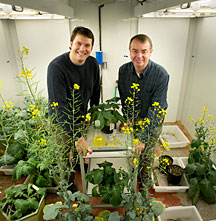- Number 365 |
- June 18, 2012
Feedback regulates plant oil production

Plant oil detectives Carl Andre and
John Shanklin.
Scientists at DOE's Brookhaven Lab have identified key elements in the biochemical mechanism plants use to limit the production of fatty acids. The results suggest ways they might target those biochemical pathways to increase the production of plant oils as a renewable resource for biofuels and industrial processes.
“There were hints that a feedback system might exist for plant oil production,” said Brookhaven biochemist John Shanklin, leader of the group publishing the work in the Proceedings of the National Academy of Sciences the week of June 4, 2012. He credits Carl Andre — a former postdoctoral research fellow now working at BASF Plant Science in North Carolina — with designing and carrying out the intricate biochemical detective work that uncovered the details.
With assistance from the Radiotracer Chemistry and Biological Imaging group at Brookhaven, Andre synthesized “labeled” forms of the fatty acids that occur as intermediates along the metabolic pathway that leads to oil production. He fed these, one at a time, to the plant cell cultures, measuring the labeled metabolites to see which would inhibit oil production. The work pointed to a fatty acid that occurs fairly late in the production process, coupled to a carrier protein, as the key intermediate that puts the brakes on oil production.
Then, the team identified this signal’s “target” — how the fatty acid actually inhibits oil synthesis. As is the case with many feedback loops, the fatty acid metabolite inhibits the activity of an enzyme that operates quite early in the oil biosynthesis pathway — in this case, the first step. That enzyme is Acetyl-CoA carboxylase, or ACCase. As the fatty acid metabolite accumulates, it inhibits this enzyme to slow down synthesis.
With the details of the oil production feedback mechanism in hand, the team is now exploring how they might interfere with the process, including biochemical schemes to keep the “slow-down” signaling metabolite from accumulating, ways to block its effects on ACCase, and more.
“If we can interrupt this process, we hope to fool the cells so they won’t be able to gauge how much oil they have made and will make more,” Shanklin said.
Full story: http://www.bnl.gov/bnlweb/pubaf/pr/PR_display.asp?prID=1418.
[Karen McNulty Walsh, 631.344.8350,
kmcnulty@bnl.gov]
